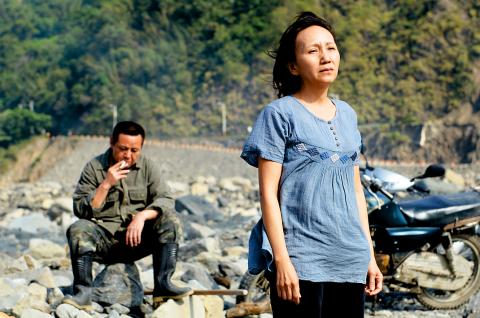Grief and healing take central stage in Kuo Chen-ti’s (郭珍弟) new film, The Boar King (山豬溫泉), which tells a deceptively quiet story of loss and rebirth inspired by the traumatic events when Typhoon Morakot devastated southern Taiwan in 2009. While it could have easily been made into a work of lachrymose sentimentality, the film thankfully doesn’t go in that direction. Instead, it looks at human suffering and pain with considerable restraint, buttressed by solid performances of Lu Yi-ching (陸弈靜) and Tsai Chen-nan (蔡振南).
Set in Baolai (寶來) in Greater Kaohsiung’s Liouguei Township (六龜), the film opens with home video footage of torrential flooding caused by Typhoon Morakot, as the off-screen cameraman witnesses the catastrophe in awe. The man’s name is Ying — played by Chen Mu-i (陳慕義) — who later disappears.
The widowed wife, Cho (Lu Yi-ching, 陸弈靜), is left with a hot spring lodge that barely survives the disaster. Seized by despair, Cho attempts and fails to commit suicide, having thought of her responsibility for Ying’s senile father, who lives with her. One day, Ying’s close friend Nan (Tsai Chen-nan, 蔡振南), a hunter, shows up at Cho’s door, offering to help rebuild the mountain inn. A reticent man, Nan has kept his tender feeling toward Cho for years.

Photo courtesy of Good Day Films
Ying’s death also brings back Cho’s step-daughter Fen (Wu I-ting, 吳伊婷), who works mundane jobs in the city. Amid grief, she meets land surveyor Garmin, played by Soda Voyu from Seediq Bale (賽德克巴萊), and love starts to bud between the two.
Meanwhile, the villagers are forced to leave the devastated area, selling their homes to a resort development company. But one by one, they receive invitations sent by Ying before he died to a banquet set to be held at the inn. Perplexed, Cho looks to the home videos shot by her late husband, hoping to unravel the secret of his death.
Five years after her less than satisfactory debut feature Step by Step (練戀舞), Kuo has returned here with a finely executed and honest work filled with lyrical moments. The polished cinematography by Paotao (寶島) allows for the full expression of nature, whether a collapsed mountain slope, a riverbed studded with massive rocks, lush woods and hidden trails.
At times, sequences from the home videos shot by Chen’s character are inserted in and fused with the present narration, not only providing clues to the man’s thinking and his mysterious disappearance, but serving a link that enables the living to search for and reconnect with the dead and to come to terms with their grief.
The daughter’s reconnection with her father also raises the issue of land and homecoming. “The mountain road to home is no longer obstructed, don’t you think?” she says to her lover. However, much of the film’s failing lies in its rather flaccid effort to explore the young woman’s transformation. Her off-screen narration appears superfluous, adding nothing significant to the story, and theater actress Wu delivers the role with punctuated intensity that sometimes belongs to the stage rather than in front of the camera.
The crowning moments in The Boar King ultimately belong to veteran thespians Lu and Tsai. In a scene toward the end, Nan recounts an unforgettable encounter with a wild boar to Cho. We follow Nan’s resonant voice into the woods, where hot spring water flows, lives are intertwined and life quietly goes on.

The 2018 nine-in-one local elections were a wild ride that no one saw coming. Entering that year, the Chinese Nationalist Party (KMT) was demoralized and in disarray — and fearing an existential crisis. By the end of the year, the party was riding high and swept most of the country in a landslide, including toppling the Democratic Progressive Party (DPP) in their Kaohsiung stronghold. Could something like that happen again on the DPP side in this year’s nine-in-one elections? The short answer is not exactly; the conditions were very specific. However, it does illustrate how swiftly every assumption early in an

Towering high above Taiwan’s capital city at 508 meters, Taipei 101 dominates the skyline. The earthquake-proof skyscraper of steel and glass has captured the imagination of professional rock climber Alex Honnold for more than a decade. Tomorrow morning, he will climb it in his signature free solo style — without ropes or protective equipment. And Netflix will broadcast it — live. The event’s announcement has drawn both excitement and trepidation, as well as some concerns over the ethical implications of attempting such a high-risk endeavor on live broadcast. Many have questioned Honnold’s desire to continues his free-solo climbs now that he’s a

Francis William White, an Englishman who late in the 1860s served as Commissioner of the Imperial Customs Service in Tainan, published the tale of a jaunt he took one winter in 1868: A visit to the interior of south Formosa (1870). White’s journey took him into the mountains, where he mused on the difficult terrain and the ease with which his little group could be ambushed in the crags and dense vegetation. At one point he stays at the house of a local near a stream on the border of indigenous territory: “Their matchlocks, which were kept in excellent order,

Jan. 19 to Jan. 25 In 1933, an all-star team of musicians and lyricists began shaping a new sound. The person who brought them together was Chen Chun-yu (陳君玉), head of Columbia Records’ arts department. Tasked with creating Taiwanese “pop music,” they released hit after hit that year, with Chen contributing lyrics to several of the songs himself. Many figures from that group, including composer Teng Yu-hsien (鄧雨賢), vocalist Chun-chun (純純, Sun-sun in Taiwanese) and lyricist Lee Lin-chiu (李臨秋) remain well-known today, particularly for the famous classic Longing for the Spring Breeze (望春風). Chen, however, is not a name